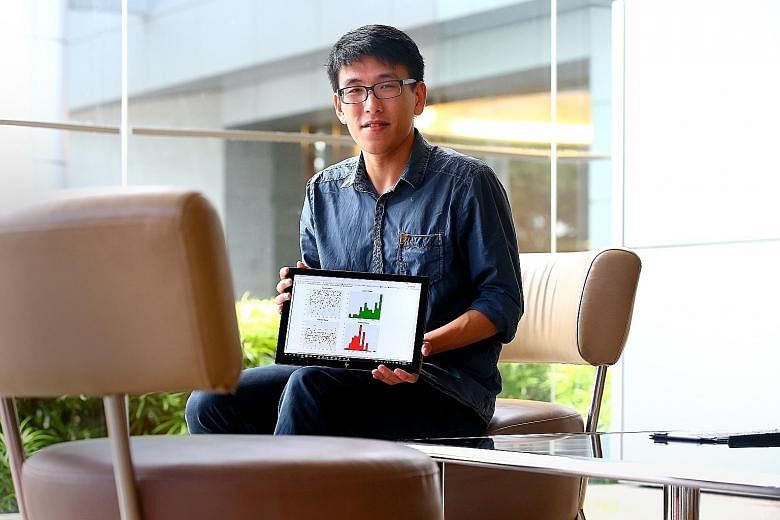A final-year National University of Singapore (NUS) law and economics student, Mr Jerrold Soh, has, together with three of his peers, created a simulator to predict the division of assets in a divorce case.
"We started hearing lawyers saying that junior lawyers would be replaced by AI (artificial intelligence)," the 26-year-old told The Straits Times. "So I thought I better find out what it is and know how it works."
The four former schoolmates started a company, Lex Quanta, in September 2016, and each handled one of four main roles - data, coding, business and law.
The first prototype of their simulator took about half a year to create, and the final version should be ready by April. It predicts the outcome of cases by computing factors, such as the total assets involved and how each party contributed to the relationship, through an algorithm. It has been tested on more than 100 past cases involving the division of matrimonial assets - the combined property from a marriage, such as the house and joint bank accounts.
In developing the simulator, Lex Quanta also tested it with more than 10 family law firms.
Ms Susan Tay, 52, founding partner at OTP Law Corporation, which was one of the firms, called the simulator "exciting" and "promising". She said she was happy that local law undergraduates were working on something like this for family law.
Lex Quanta aims to extend the simulator's capabilities to other cases, including those involving personal injuries such as traffic accidents, and commercial cases such as contract and intellectual property disputes.
Mr Soh said they hope the simulator will bring legal services to more people. "If, as a member of the public, you use a simplified version of the simulator, you can get a rough sense of your problem and see if you should get a lawyer."
Mr Soh dismissed all notion of a future scenario in which he would end up losing his job, pointing out that AI lacked the human touch. "It (the program) does not consider emotional factors unless you programme it to. But I think that's very difficult to do," said Mr Soh, adding that it was tough for AI to decide who gets custody of the children.
"If you're saying 'I'm going to let this machine decide divorces on its own without any human involvement', then I would be hesitant. But if we can use this algorithm to assist the human to make the final human judgment, then I don't see any problem with it."
A Hwa Chong Junior College graduate, Mr Soh does not stay on campus, and splits his time in university between the Faculty of Arts and Social Science in Kent Ridge, and the Faculty of Law in Bukit Timah.
He said that balancing his roles in the company and his schoolwork required a lot of focus and efficiency.
"Whatever time I'm not spending in school, I'm spending on this."
There was also relevance between what he learnt in school and in his line of work, said Mr Soh.
Lex Quanta will operate out of a co-working space called Collision 8, at High Street Centre opposite the Supreme Court, as part of the Future Law Innovation Programme, bringing the co-founders closer to others in the legal field. This will help them share expertise and get opinions on new ideas quickly.
In response to queries from ST, a Law Society spokesman said: "The Law Society is strongly supportive of innovation and adoption of technology by our law firms to be more time-efficient, cost-effective and competitive."


